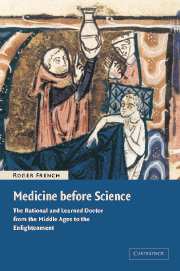5 - The weakening of the Latin tradition
Published online by Cambridge University Press: 10 December 2009
Summary
INTRODUCTION
Medical scholasticism may not have died in the Black Death, but it was not quite the same afterwards. The ambitions of the early scholastics had not been realised, and it was recognised that the goal of achieving a prelapsarian state of knowledge was unobtainable. The guild-like structures of various branches of knowledge discouraged interdisciplinary approaches. The technicalities of Avicenna and the New Galen did not encourge clerics to continue to engage in medicine. Following the institutional separation of medical theory and practice in Paris and Bologna before the Black Death, practical medicine became more important and better rewarded, while theory was reduced simply to an introduction. The ethos that led Gentile da Foligno to lofty heights of entirely impractical speculation was rejected by his pupil Tommaso de Garbo, who found his teacher too prolix. Tommaso wielded the famous razor of the Oxonian Ockham and thought it undesirable to multiply entities; in particular he had a nominalist's dislike of elaborate and numerous distinctions. For example, where Gentile, calling himself an oculista, had a hugely elaborate theory of vision, Tommaso denied that a real species – a quasi-material simulacrum – moved between object and eye. Believing that shape, number and motion signified only things in the soul and could not be sensed per se, Tommaso seems happy to disagree even with Aristotle.
- Type
- Chapter
- Information
- Medicine before ScienceThe Business of Medicine from the Middle Ages to the Enlightenment, pp. 127 - 154Publisher: Cambridge University PressPrint publication year: 2003



